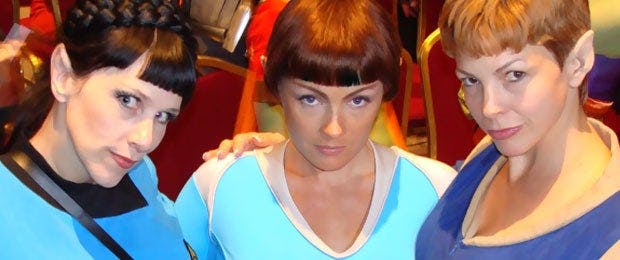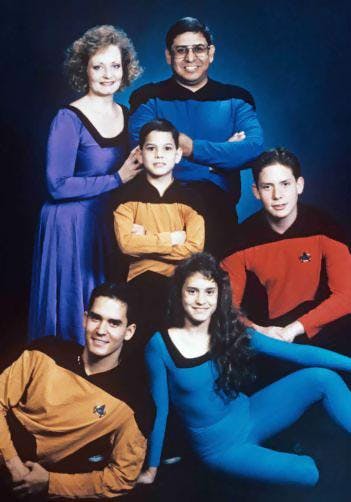Published Mar 15, 2014
A Study On Geek Girls, Part 1
A Study On Geek Girls, Part 1

As Always, It Started With Star Trek: A Study On Geek Girls
For many years, whenever people would tell me that girls are rare in geek culture, my instant reaction would always be: "Well, no.”

Exhibit A. Source.
I would be surprised and a little bit puzzled at their assumption and would instantly think of all the women who were fans or contributors to the Star Trek franchise. Having been a Trekkie for as long as I can remember, I have read several books and watched documentaries about the fandom: Jeff Greenwald’s Future Perfect: How Star Trek Conquered Planet Earth and Trekkies and Trekkies 2 are obvious examples. These, and many news reports about conventions around the world, although particularly in the United States of America and England, showed numerous women taking part in the fandom. Sometimes, the whole family attended conventions, sporting their Starfleet uniform. What a great concept for a family photo (see exhibit A). And let’s not forget that the franchise might have died out completly in the 1960s had it not been for the efforts of Betty Jo Trimble, who is lovingly called "the woman who saved Star Trek."
As I got to discover more spheres of geek culture, I kept finding that the assumption that very few women were part of it was generalized, even among women.
In some cases, it may have seemed to be justified: there are very few well known female professional gamers, there are generally less women at my comic book shop than there are men, and some customer surveys do seem to indicate that there are areas in which men are more numerous than women. Yet I always felt that these elements were not valid indicators of the participation of women in geek culture: indeed, in general there seem to be fewer women than men who visit my local comic book shop. Maybe they prefer to buy comics online, in other shops or borrow them from people they know. It is possible that they walk in with their dad, don’t buy anything, and then read his comics for free (as I did before I entered my 20s).
Surveys, in particular, are often biased and offer limited insight. For instance, surveys produced by DC comics, Comixology and Brett Schenker provide drastically different results, particularly regarding female readership. DC’s survey is particularly problematic because of the limited number of people who bothered to answer the questionnaire, and because the publisher was targeting a male audience to begin with. For more information, consult Jill Pantozzi’s detailed analysis of the survey on the Mary Sue blog.
Additionally, certain fandoms seem to have always attracted men and women alike. It would seem to be the case for Doctor Who, Star Wars, and the works of Joss Whedon and Tolkien, as documentaries such as Done the Impossible: The Fans’ Tale of Firefly and Serenity and Ringers hint to.

Star Trek Fans Star Trek (2009) Film Premiere. Source.
For all these reasons, the assumption that women are rare in geekdom, that they are unicorns of sorts, seemed fascinating and completely erroneous to me. My own curiosity and anthropological training urged me to further explore why so few geeks were questioning it.
Then the fake geek girl scandal came along.
In 2012, I became absorbed by the intense debates which took place on blogs, news reports, videos, comment threads, at geek events, and in other spaces. For over a year, I mapped the interventions which received the most public attention and reactions and analysed them. The result of this work is a paper I presented at the 2013 annual meeting of the American Anthropological Association, and the Geek Girl Survey.
Through this whole process, my own experience within geek culture, particularly as a Trekkie, has provided valuable insight. Of course, I would say that being a Star Trek fan has provided insight throghout my entire life and particularly in relation to my studies in anthropology. Afterall, TNG had a lot to do with my career choice.
Over the course of the next few weeks, I will introduce my research on The Geek Anthropologist blog, and I will be sharing various materials or ongoing projects related to geek girls. I hope you will share your own thoughts and stories with me as we move along.
Marie-Pierre Renaud is graduate student of sociocultural anthropology in Laval University, Quebec, Canada. She specializes in native studies and her work focuses on healing and reconciliation processes. As the founder and a co-editor of The Geek Anthropologist blog, which is dedicated to the anthropological study of geek culture and all things geek, she writes about women in geek culture, the representations of indigenous peoples in science-fiction, and the changing definitions of geekiness. She can be reached at thegeekanthropologist[at]gmail.com.

